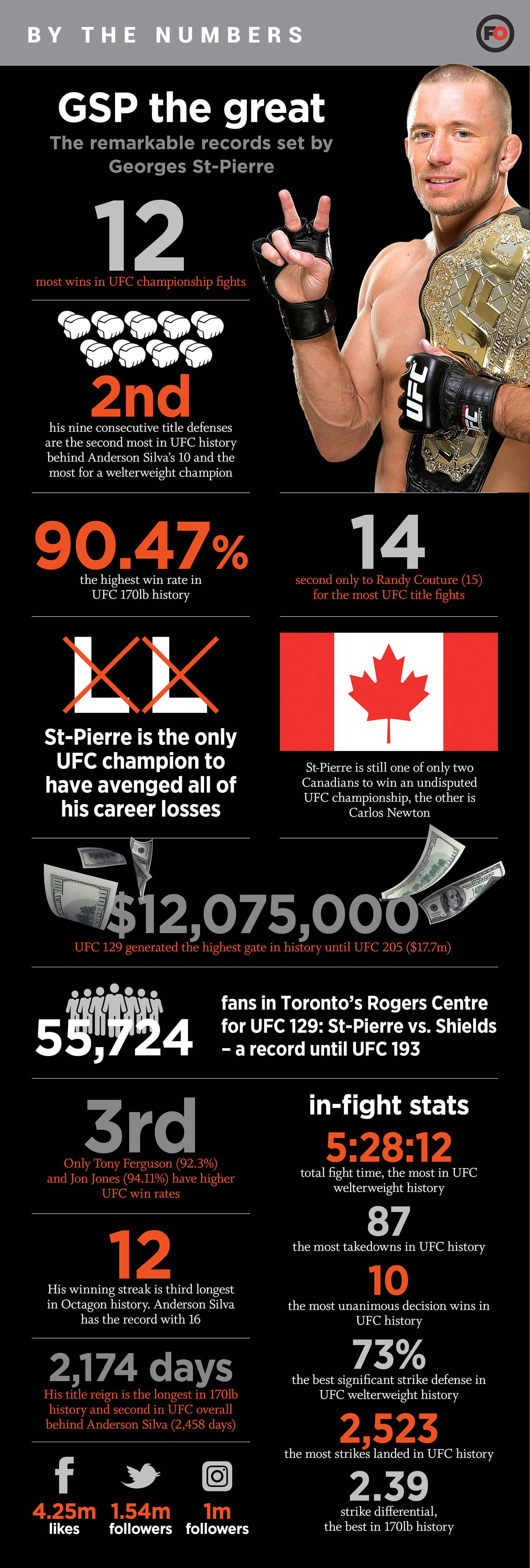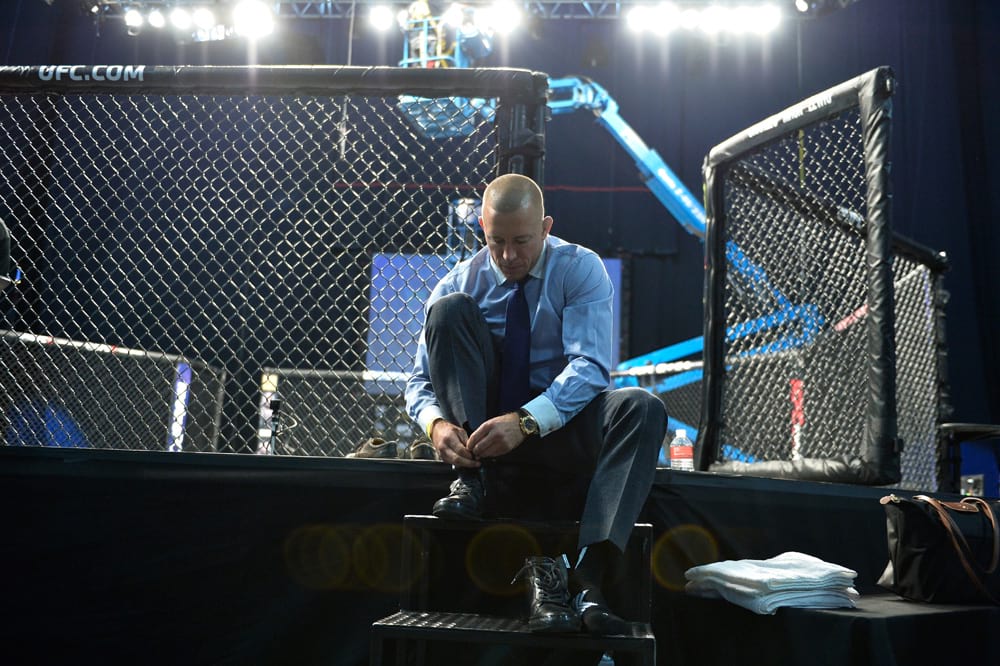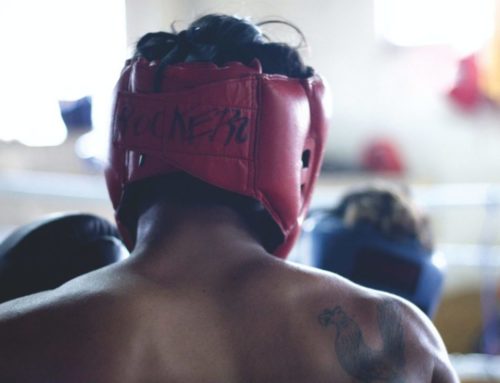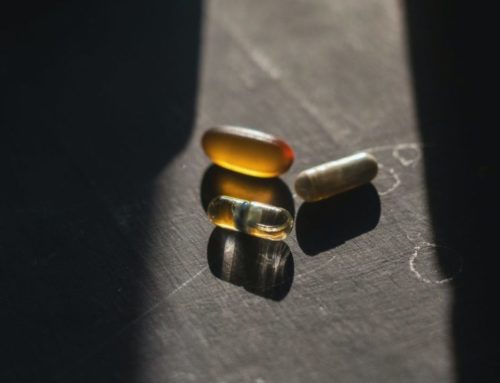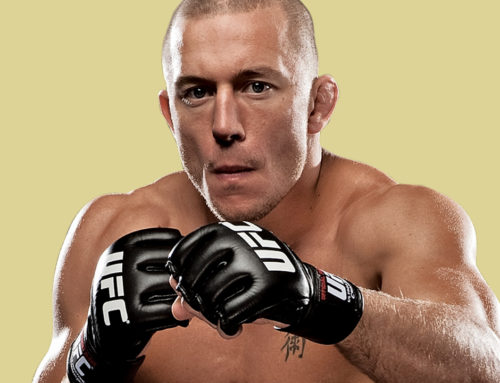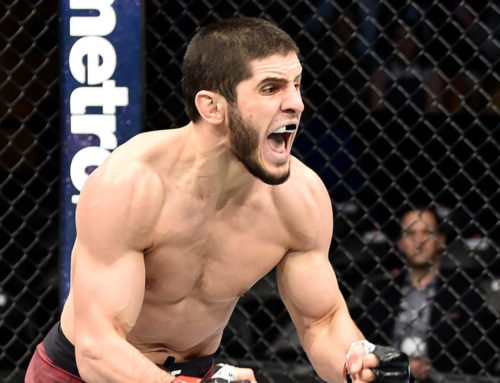In an age of wealthy, trash-talking, social media savvy champions, Fighters Only asks where a former welterweight king who built his reign on respect and traditional martial arts virtues fits in…
*** This feature originally appeared in the June 2017 issue of Fighters Only ***
For Georges ‘Rush’ St-Pierre, the door was always left open, invitingly so. It was left open by Georges himself and it was left open, also, by the Ultimate Fighting Championship (UFC), which is to say retirement, that thing St-Pierre announced in 2013, was never likely to be a permanent state. There were too many unanswered questions and too much money attached to the comeback for this to be the case.
In leaving the door open, however, St-Pierre, the former UFC welterweight champion, has inadvertently become the man who goes away on holiday, wrestles with the fear he has forgotten to do something – turn the gas off, switch the lights off, lock up – and returns two weeks later to find his furniture upended, his plasma television ripped off the wall and all manner of destruction in a place he once called home. Same building but different. Door ajar, welcoming all-comers, he has somehow lost control over something that was once his. It happens. Now imagine leaving your house unlocked for four years.
GSP, as he’s also known, will return to the UFC’s Octagon in 2017 following a four-year hiatus and will do so in a new era of mixed martial arts, a new era for the UFC, a new era for fighters. Once the golden boy of a sport and a company, St-Pierre will soon realise that just as fighters are able to move on – and retire only to then un-retire – so too can an industry and an entire fan base. Nobody hits pause for four years. Life continues. St-Pierre surely knows this now. He will have been aware of the changes, conscious of the new faces, the new stars, the GSP replacements. He will have felt the shift beneath his feet.
Now, on the cusp of a comeback, St-Pierre is Woody kicked under the bed for four years and replaced by cooler toys and iPads. He is a Bob Dylan folk song when the world – and soon Dylan – has gone electric. Georges, bless him, is still smiling that matinee idol smile, bowing at every opportunity, talking about his ‘riddum’ and telling you he’s not impressed with your performance. Only, in his absence, the likes of Conor McGregor and Ronda Rousey and, to a lesser extent, Jon Jones, have redefined what it means to be an MMA star. In going electric, they have taken St-Pierre’s popularity and roundly mocked and then surpassed it. Sold-out arenas? No big deal. Record-breaking pay-per-view numbers? Consider it done. Better yet, they have penetrated the mainstream in a way St-Pierre’s athletic prowess, welterweight dominance and boy-you’d-love-your-daughter-to-date package never could beyond Canada.
It’s a different climate, too. The sport, thanks in no small part to St-Pierre, is in a much better place than it was in 2013. I say better place, what I actually mean is this: mixed martial arts is now a more established and popular sport. It is no longer quite so underground. There are movies made about it. It’s a drug of choice for half of Hollywood. Meryl Streep disses it at the Golden Globes. There is now a spotlight MMA enjoys that it lacked during GSP’s welterweight reign.
This newfound attention has been fuelled by a new kind of hero. Or, specifically, antihero. McGregor and Rousey, stars of the post-GSP world, have excelled not just because they have shown themselves to be a cut above most in the talent stakes but also because they don’t mind saying the wrong thing at the right time. They speak their mind. They polarise. Love them, hate them, you’ll watch them. They’ve created that kind of dynamic, that kind of interest in their persona, and it goes phone in hand with the world in which we live, a world powered by social media and viral videos and memes and self-aggrandising blowhards and narcissists; the say-stuff-even-if-you-don’t-mean-it-so-long-as-it-gets-you-ahead age.
St-Pierre doesn’t belong to this, nor will he try fitting in. This was made abundantly clear the moment he let Michael Bisping, reportedly his next opponent, talk all over him at a press conference to announce their scheduled middleweight title fight later this year. There and then St-Pierre, in the blink of an eye, seemed four years behind Bisping in terms of trash talk and the ability to sell. He was still figuring out the new rules. Catching up.
Bisping, of course, began his shtick by turning up late. A move disrespectful to some – namely, his opponent – the move was, to us, the spectator, completely expected, par for the course. It added to the drama. It created suspense. The only surprise was that Bisping wasn’t dressed in mink.
“No one gives a f**k, Georges,” ‘The Count’ said on arrival.
It was shocking and crass and unapologetically Bisping, but that one line, spat as St-Pierre carefully outlined his plans at the age of 35, kind of got to the nub of it. People will watch St-Pierre fight. That’s a given. He hasn’t lost a bout in ten years. He’s a phenomenal competitor. But it’s true, also, that the days of people caring about what a veteran fighter has to say at the dais are fast disappearing. Instead, they now want bad language and lobbed water bottles. They want palpable tension and the feeling that things could spiral out of control at any moment. They want mayhem.
GSP, in direct contrast to this, turned up in a grey suit and spoke with logic and reason. He was polite. Who wants that? Bisping, on the other hand, rocked a leather jacket, was accused of being intoxicated, and then dropped close to a dozen F-bombs within the first couple of minutes of being onstage. That’s more like it.
“No one cares what you did,” Bisping told St-Pierre. “You’re coming back, the sport is in a different place, game over.”
“I think you should shut up,” was St-Pierre’s attempted comeback. “You’re embarrassing yourself right now. Are you ok? Did you get hit too much?”
“Georges, I’ll go out on an all-night bender and I won’t even f***ing train and I’ll still beat you. Look at the state of you, you f***ing midget.”
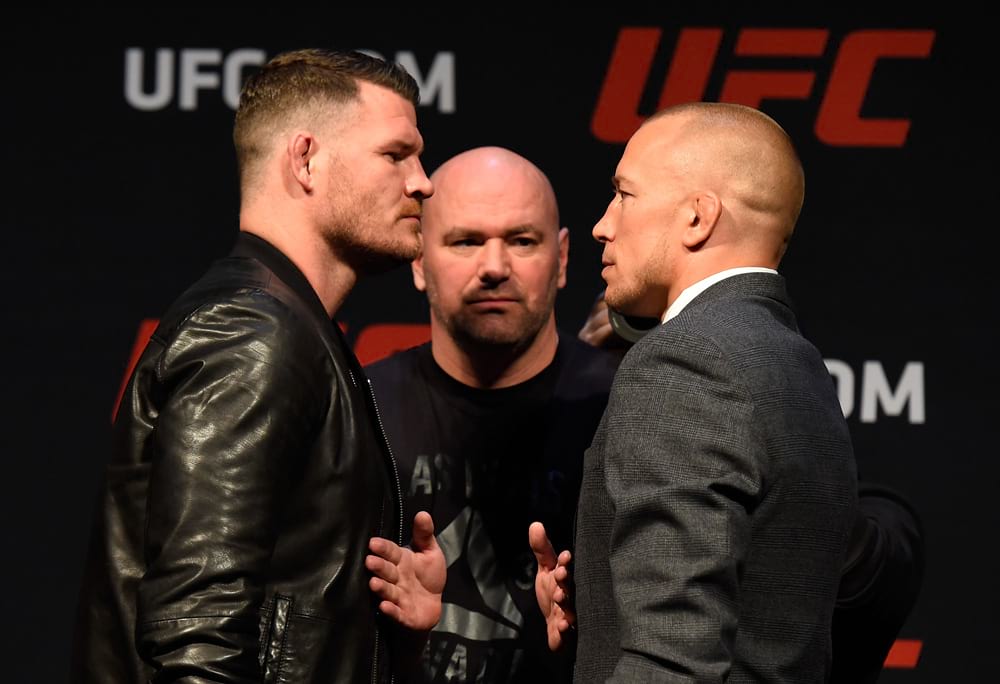
This exchange brought to mind a story St-Pierre told me in 2009. It began with a scene straight from a coming-of-age movie: Georges and his friend, Mathieu, were en route to the bus after school when they were approached by a group of older delinquents. Georges and Mathieu waited for the bus alongside some other friends – not tough guys, not popular kids, what Georges described as “nerds or geeks” – and it was while stood waiting for the bus that Georges suddenly heard a spitting sound. “Almost sounded like it was starting to rain,” he recalled. Next thing he knew, Mathieu, petrified, raced on up ahead, and it was then, in the process of following him, Georges noticed saliva on the back of his friend’s coat. The coat came off and Mathieu despondently shook his head. He wanted to go home. Forget about it. But Georges, riled by the incident, had sights set only on retribution. He wanted to make a point. He needed to stand up to the bullies. So, with revenge on the brain, he pretended he had forgotten his pencil case and headed back towards the delinquents on the wall. “I closed my fist behind my back, clenched it tight, and smiled,” he said. “As soon as I got level, I raced towards the first bully and hit him square on the jaw. He went down hard and the other two bullies jumped on me.”
Georges didn’t rewrite history in order to claim victory. He admitted he was outnumbered, out of his depth and duly handled. But he did take pride in the fact he was left alone, for the most part, from that day forward. More than that, the anecdote serves to highlight Georges’ history and his foundation and goes a way to explaining why he will never be your trash-talking alpha male or bully.
“I never looked for trouble at any stage in my life,” he said. “I didn’t like to start fights or intimidate people. My reason for learning martial arts was simply to give myself the ability to defend and protect myself against others.
“People sometimes get the wrong impression of fighters and just assume we always want to fight and show off our skills in any possible situation. They think we’re always looking to beat someone up. It’s not true at all. I have never fought in the street or to just show off. MMA is my art – it’s the skill I use in performance.”
St-Pierre might be one of the few remaining artists in a discipline Meryl Streep insists isn’t one of the arts. He is what was once known as a role model, a poster boy, the very embodiment of all that is good about people who punch other people in the face for a living. Yet this is the time of tough guys and loudmouths and people who spout crazy stuff and do crazy stuff and apologise to absolutely f***ing no one. Alas, St-Pierre, a self-confessed scaredy cat, is also now something of an anomaly.
“I’m not afraid to admit I get scared before a fight,” he said. “I’m always scared before a fight. I’m scared to fail, scared of getting knocked out and scared to let down all the people who believe in me. But I’ve learnt to deal with my fear a bit better with experience. For example, I no longer panic or go crazy if I can’t sleep the night before a fight. I used to sit up in bed at four o’clock in the morning and say to myself, ‘I haven’t slept one minute – I’m going to get destroyed tomorrow.’”
GSP has never been much of a talker. Anyone who has followed the man’s career knows this to be true. But he has, without question, been a hell of a fighter; a dominant fighter for whom losing a round was deemed an unforgivable sin; a fighter who cleared out an entire weight division; a fighter who, working backwards, claimed the scalps of Johny Hendricks, Nick Diaz, Carlos Condit, Jake Shields, Josh Koscheck, Dan Hardy, Thiago Alves, BJ Penn, Jon Fitch and Matt Serra.
He’s also a fighter who typically takes the long, scenic route. Which is why only two of the aforementioned – Serra and Penn – were stopped within the scheduled distance. Which is why he hasn’t finished a fight for eight years. Which is why St-Pierre, a man considered safety-first back in 2013, might struggle to impress a new breed of fight fan predisposed to ‘Mystic Mac’ forecasts and quick, stunning knockouts.
“I think my fear does affect the way I fight,” St-Pierre told me. “I break down everything mathematically and try to put all the chance on my side. I split a fight into three key steps and maintain I’m ahead in each. I have the physical step, which is basically getting in shape via training and being able to look across at your opponent and know you are in better shape than he is. I also have the technical step, which deals with the superior skills you must have going into a fight. Finally, the tactical step, which requires you doing your research, constructing a game plan and knowing each of your opponent’s weaknesses.
“I know that if I can conquer my opponent in those steps, I will come away with the victory.”
The words of the thinking man’s fighter; measured, intelligent, full of insight. Yet, equally, words almost vanilla and passé in comparison to those of McGregor, the number one attraction in the sport, who outlines how he will rest his balls on the forehead of the next “midget” wrestler he faces to the sound of rapturous applause and laughter.
“No one gives a f**k, Georges,” Bisping reminds a legend.
Welcome back.
